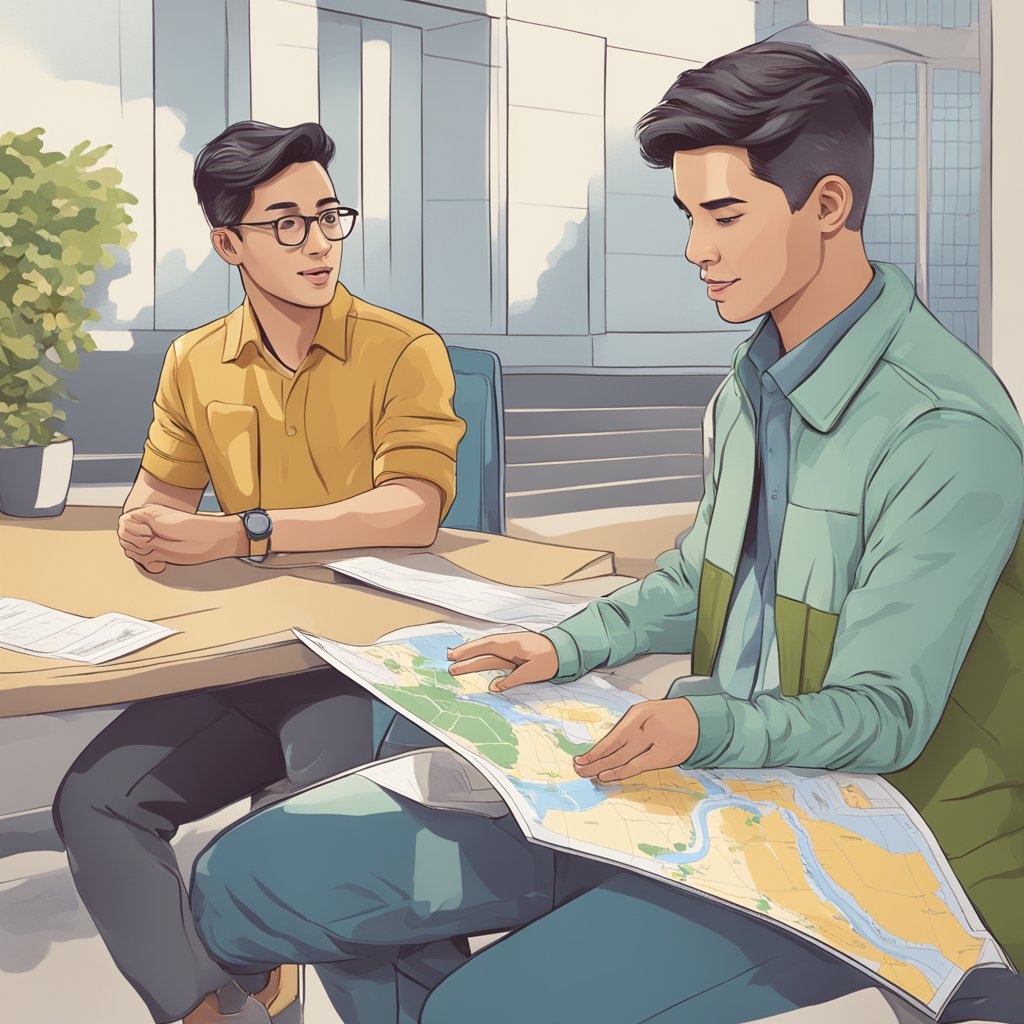Survival phrases are essential for any traveler, especially when it comes to asking for directions. In an English-speaking country, knowing how to ask for directions can make a huge difference in getting to your destination. Whether you’re lost in a big city or trying to find a specific location, using the right phrases can help you communicate effectively with locals and get the help you need.

In this article, I will introduce some common survival phrases for asking for directions in English. These phrases will cover everything from asking for street names and landmarks to getting help with public transportation. By learning these phrases, you’ll be able to confidently navigate your way around an English-speaking country and make the most out of your travels. So, let’s get started!
Basic Survival Phrases
As an English speaker, it’s important to know some basic phrases to help you navigate your way around when traveling to a foreign country. Here are some essential survival phrases that will come in handy:
- Hi/Hello: These are the most basic greetings you can use to start a conversation with someone. You can use either of them interchangeably.
- How are you?: This is a common question that people ask to show concern for the other person’s well-being. You can respond with “I’m good” or “I’m fine” if you’re feeling okay.
- Goodbye/See you: These are phrases you can use to say goodbye to someone. You can use either of them interchangeably.
- Excuse me: This phrase is used to get someone’s attention or to apologize for interrupting them.
- Thank you: This is a polite way to express gratitude for someone’s help or kindness.
- Sorry: This is a way to apologize for something you did wrong or to show empathy for someone else’s situation.
- Please: This is a polite way to ask for something or to make a request.
- You’re welcome: This is a response to someone thanking you for something. It’s a polite way to say that you’re happy to help.
- Don’t worry: This is a phrase you can use to reassure someone who is worried or anxious about something.
- Speak a little slower: If you’re having trouble understanding someone, you can use this phrase to ask them to slow down when speaking.
- I don’t understand: If you don’t understand something someone said, you can use this phrase to ask them to repeat it or explain it in a different way.
- I’m sorry: This is a way to apologize for not understanding something or for making a mistake.
Learning these basic survival phrases in English will help you communicate effectively with others and make your travels much smoother.
Asking for Directions

As a traveler, asking for directions is an essential skill that you need to master. Here are some useful phrases that you can use to ask for directions in English:
- Excuse me, could you tell me how to get to [destination]?
- Could you give me directions to [destination]?
- I’m lost. Can you help me find my way to [destination]?
- Which way is [destination]?
- Can you point me in the right direction to [destination]?
When asking for directions, it’s important to use the right words to convey your message clearly. Here are some English words and phrases that you can use to make your request more effective:
- Right: When someone tells you to turn right, it means that you should take the first turn to your right.
- Near: If someone tells you that your destination is near, it means that it’s not far away.
- Question: If you have a question about the directions, don’t hesitate to ask for clarification.
- Write it down: If you’re not sure you’ll remember the directions, ask the person to write them down for you.
When someone gives you directions, make sure you understand them clearly. Here are some English phrases that you can use to confirm that you’ve got it right:
- Let me repeat that back to you. Is this correct?
- So, I need to turn left at the traffic lights, and then go straight ahead?
- Thank you. I think I’ve got it now.
In summary, asking for directions in English is not difficult if you know the right phrases to use. Be confident, knowledgeable, and clear when making your request, and don’t be afraid to ask questions or ask for clarification if you need it.
Communication in Transportation
As a frequent traveler, I understand the importance of being able to communicate effectively in transportation situations. Whether it’s taking a bus, train, or taxi, being able to ask for directions and understand the responses can make all the difference in getting to your destination on time and with minimal stress.
When taking public transportation, it’s important to know the basics such as how to ask for a ticket, platform, or return ticket. For example, when at a train station, you could ask the ticket agent “Can I have a return ticket to London, please?” or “Which platform is the train to Manchester departing from?”.
If you’re taking a taxi, it’s important to be able to communicate with the driver to ensure you arrive at the correct location. You could ask “Can you take me to the airport, please?” or “How much will it cost to go to the train station?”.
In some cases, it may be helpful to have a list of common phrases or questions written down to refer to, especially if you’re in a foreign country where English is not the primary language. This can help alleviate any confusion or misunderstandings.
Overall, being able to communicate effectively in transportation situations can make your travels much smoother and less stressful. Remember to stay confident, clear, and neutral in your tone of voice to convey your message effectively.
Dining and Shopping Conversations
When dining or shopping in an English-speaking country, it is essential to know some survival phrases to help you navigate your way through the experience. Here are some phrases that can come in handy:
- “Table for two, please”: This phrase is useful when you are at a restaurant and want to request a table for two people.
- “Can I see the menu, please?”: Use this phrase to ask for the menu when you are ready to order.
- “Could we have the bill, please?”: This phrase is used when you are ready to pay for your meal.
- “What’s the total, including the tip?”: This phrase can be used when you want to know the total amount you need to pay, including the tip.
- “I’d like to make a reservation for two for tonight”: Use this phrase when you want to book a table in advance.
- “Could we have a table by the window, please?”: This phrase can be used when you want to request a specific table location.
- “I’ll have a coffee, please”: This phrase is used when you want to order a cup of coffee.
- “Could I see the wine list, please?”: Use this phrase to request the wine list when you are ready to order.
- “I’ll have a Caesar salad, please”: This phrase is used when you want to order a specific dish.
- “Could you recommend any good restaurants around here?”: This phrase can be used when you are looking for recommendations for good restaurants in the area.
- “Do you have any vegetarian options?”: Use this phrase when you want to know if there are any vegetarian options available.
- “Where is the nearest shopping mall?”: This phrase is useful when you want to know where the nearest shopping mall is located.
Knowing these phrases can help you feel more confident and knowledgeable when dining or shopping in an English-speaking country.
Learning English for Travelers
As a frequent traveler, I understand the importance of being able to communicate in English. Learning a new language can be challenging, but it can also be a rewarding experience. In this section, I will share some tips and tricks that can help you learn English quickly and efficiently.
Language Learning
Learning a new language requires dedication and effort. You need to be motivated and committed to the process. It is essential to set realistic goals and work towards achieving them. You can start by learning basic vocabulary and phrases that will help you communicate in English.
Learning English
English is a widely spoken language, and it is considered the universal language of business and international relations. Learning English can open up a world of opportunities for you, both personally and professionally. There are many resources available to help you learn English, including language schools, online courses, and language exchange programs.
Foreign Language
English is a foreign language for many people, and it can be challenging to learn. However, with the right mindset and approach, anyone can learn English. It is essential to practice regularly and immerse yourself in the language as much as possible.
Lessons
Taking English lessons can be an effective way to learn the language. You can choose to take classes in a traditional classroom setting or online. It is essential to find a teacher who can help you achieve your goals and provide you with the support you need to succeed.
Travelers
As a traveler, knowing how to communicate in English can make your trip more enjoyable and stress-free. You can ask for directions, order food, and make new friends. Learning basic English phrases and expressions can help you navigate unfamiliar situations and make the most of your travels.
Fluency
Fluency in English takes time and practice. It is essential to practice speaking, listening, reading, and writing in English regularly. You can also watch English movies, listen to English music, and read English books to improve your fluency.
Conversations
Having conversations in English can help you improve your language skills and build your confidence. You can practice with native speakers or other language learners. It is essential to be patient and not be afraid to make mistakes.
Expressions and Greetings
Learning English expressions and greetings can help you start conversations and make a good impression. Some common expressions include “How are you?” and “Nice to meet you.” It is essential to practice these phrases and use them in real-life situations.
In conclusion, learning English can be a challenging but rewarding experience. By following these tips and tricks, you can improve your language skills and become more confident in your ability to communicate in English.
Handling Emergencies
In case of an emergency, it is important to know the right phrases to ask for help. Here are some essential survival phrases to handle emergencies:
- Help! – Use this phrase to get someone’s attention quickly and ask for assistance.
- Call the police! – If you are in danger or witness a crime, use this phrase to ask someone to call the police.
- I need a doctor! – If you or someone else is injured or ill, use this phrase to ask for medical assistance.
- Can you communicate with me? – If you are in a situation where you cannot understand the language being spoken, use this phrase to ask if the other person can communicate with you in English.
It is important to remain calm and speak clearly when using these phrases. If possible, try to provide specific details about the emergency, such as your location or the type of injury.
Remember, in an emergency situation, time is of the essence. Knowing these essential phrases can help you quickly and effectively communicate your needs and get the help you need.